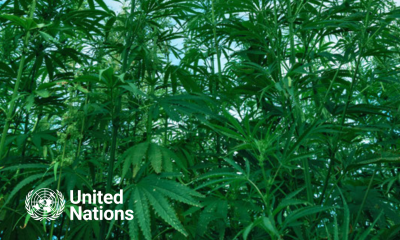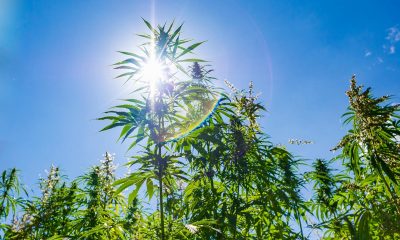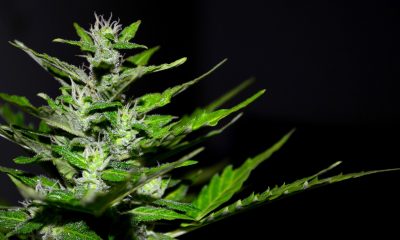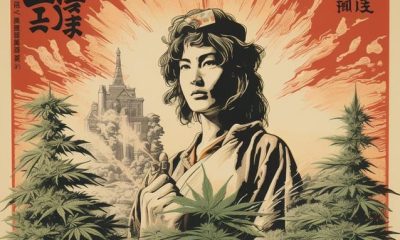International
Uruguay, a unique case in the world. Find out why.
Published
2 years agoem

The Oriental Republic of Uruguay, a small South American country sandwiched between Brazil and Argentina, was the first country in the world to legalize cannabis for all purposes, alongside domestic cultivation, at the initiative of the government. This is a unique case in the world. Despite not having solved all the problems that served as an argument to boost the passage of the law, it served as an example and proved that this model of legalization was not the catastrophe that the detractors announced, including the Cabinet. of the United Nations on Drugs and Crime (UNODC).
The debate on the legalization of cannabis in Uruguay had been on the agenda for several years, with the presentation of a bill by the then deputy Luis Lacalle Pou, which proposed the legalization of domestic cultivation, and another from 2012, in which the The Frente Amplio government, led by José Mujica, proposed to legalize the cannabis trade in a state-controlled manner. Considered a sensitive topic, the debate was extended until the following year, which allowed to receive contributions from activist organizations, hold events and generate a lively public debate, where many public figures gave their face for legalization. Finally, at the end of 2013, and after several amendments to the initial draft law, President José Mujica decided to proceed with the passage of the law. The cannabis legalization laws were part of a package of measures they called “Strategy for coexistence and citizen security”, which defended the need to protect public health and reduce costs related to the consumption of cannabis, placing emphasis on the fight against drug trafficking and organized crime. this is nota time when Uruguay was experiencing a wave of crimes in areas where these traditionally did not happen and which the media related to the drug problem.[ppp_patron_only level=”3″ silent=”no”]
 Thus, after approval in Parliament, which took place in July of that year, it was up to ao Senate, on December 10, 2013, after a session lasting more than 12 hours, to approve Law nº 19.172, which would regulate the “import, production, purchase, storage, marketing and distribution of cannabis and its derivatives for medicinal and recreational purposes”.
Thus, after approval in Parliament, which took place in July of that year, it was up to ao Senate, on December 10, 2013, after a session lasting more than 12 hours, to approve Law nº 19.172, which would regulate the “import, production, purchase, storage, marketing and distribution of cannabis and its derivatives for medicinal and recreational purposes”.
In parliament the margin was small: 50 votes in favor and 46 against; in the Senate, he obtained 16 favorable votes from the Frente Amplio senators among the 29 members present. And from then on, the cultivation, consumption and sale of cannabis became legal in the country. Note that we are not talking about medical cannabis, only consumption for “adult use”. Medical cannabis would only be discussed and regulated later, in 2018.
Uruguay is a unique case in the world. Not just because it pioneered the legalization of recreational cannabis use across the planet, but because it was a political initiative. “When the law was passed, about 60% of the population was against legalization”, explains Rosario Queirolo, political scientist, teacher and head of the Department of Social Sciences at the Catholic University of Uruguay. “Contrary to what happens in all countries, legalization in Uruguay was a top-down measure”, he says. Although there is an activist movement in the country that also participated in the discussion, finally getting approval for the sale of cannabis through members-only clubs, it was not a decision derived from pressure from civil society.
The road to normalization
As stipulated in the Article 2 of the Law No. 19.172, “The State will assume control and regulation of the activities of import, export, planting, cultivation, harvesting, production, acquisition in any capacity, storage, marketing and distribution of cannabis and its derivatives, or hemp when applicable, through the institutions to which the legal mandate had been granted, in accordance with the provisions of this law and under the terms and conditions established in this regard by the regulations”. For this purpose, the Instituto de Regulación y Control del Cannabis (IRCCA), under the Ministry of Health, responsible for regulating, inspecting and managing all matters related to its trade and consumption.

Rosario Queirolo, Politologist and Researcher at the Catholic University of Uruguay
At the time, users had two ways to obtain cannabis: through home cultivation or by becoming a member of a cannabis club. Only later, starting in 2017, did it start to be sold in pharmacies. Clubs and growers must be registered with IRCCA, in a “non-public database”. Records, purchases and sales enter a system that allows managing all related processes and having control over the activity, both of users and clubs and pharmacies. Use is restricted to over 18s and each user can purchase up to 40 grams per month. Growers can have up to 6 plants or harvest up to 480 grams annually.
Despite the bureaucracy and all the measures that need to be taken to be able to set up a cannabis club, the process is accessible and transparent and can be done online. At the moment, the country has eight psychoactive cultivation registers for medicinal use and five for recreational use, 12.694 people registered for home cultivation, 45.550 registrations for acquisition in 19 pharmacies legally sold and 178 clubs with a total of 5395 members. Cannabis social clubs are also one of the most popular forms of supply, but unlike in other countries around the world, their role is not so much that of being a social space for consumption driven by activists, but rather of providing their members with quality herb, in a controlled and legal way.
Mafalda Pardal, Portuguese researcher and assistant professor at the Department of Criminology, Criminal and Social Law at the University of Gent, in Belgium, dedicated her doctoral thesis to the study of cannabis social clubs in that country. When she talks about the Uruguayan case, she also says that it is “a unique case in the world”. As she explains, “In the rest of the countries, cannabis clubs are a movement grassroots: it is the activists who organize and stretch the laws or take advantage of the gaps in order to function. In Uruguay, it is the legislation that defines the functioning of the club and, for the first time, we find perfectly legal social clubs.” Although it was activists who managed to get the government to introduce cannabis clubs into legislation, the way it works is quite different, being a kind of dispensary, for members only. “It was only in 2018 that an additional resolution appeared that introduced the element of a social area”, says the researcher.

Mafalda Pardal, Researcher
Mafalda and Rosario queirolo collaborated on a study that focused precisely on this subject. Published under the title “Uruguayan Cannabis Social Clubs: From activism to dispensaries?”, The researchers wanted to try to understand how the club model had been implemented “in practice” and concluded that, due to the legal framework that requires the installation of an advanced security system, which does not allow advertising or location signs and requires having the out of sight, among other factors, contributed to the evolution of clubs towards this model of quasi-dispensaries. “Some members complain that the law limits them to being a dispensary. Others said that they would like to have lectures and activities and that it was not allowed”, explains Mafalda. “But, at the same time, they say that many of the partners do not want to participate in these activities and prefer to maintain their privacy, favoring the quality of the product or access to a specific variety that they like”.
The gray side of legalization
Before legalization, the so-called Paraguayan ou pressing. It is still found today and consists of a mixture of grass, pollen, seeds and other substances, in the shape of a brick, which arrives in most parts of Paraguay. It is a product that usually has a very high degree of contamination. and whose production is often carried out in a rudimentary way, without any hygienic conditions. In short: poor quality weed, cut with potentially harmful substances.
Therefore, it is not strange that nowadays, as Mafalda tells us, one of the reasons most mentioned by members of cannabis clubs when explaining what leads them to register is “the possibility of having a product good gourmet food ou high end".
There are some “social” clubs and others that work more with a cooperative model, but according to Mafalda “it ends up becoming a somewhat elitist model, because not all users have the money to pay the fees and the product. Not for the most casual user.” Registration can cost between US$45 and US$650 and product prices can range from US$0,91 to US$5 per gram. It is the clubs that define the values of the quotas: “Some, more faithful to the idea of cooperativism, can exchange quotas for hours of work, for example, at harvest time anyone who wants to collaborate can have a reduction in the membership fee”, he explains.
The other side of the coin, concludes Rosario, is that those who cannot pay the quotas, such as people of lower economic level, “continue to consume pressed, which still circulates, although in a much smaller quantity.”

Although there are still some businesses outside the law, the general opinion in the country, which studies confirm, is that the legalization was positive and did not bring the problems that the most skeptical touted. "What we observed is that the prevalence of consumption did not increase, especially among adolescents. At least it did not increase more than it had already been increasing and it was also not expected that it would stop after legalization” concludes Queirolo, explaining that these data confirm what has been observed in the rest of the world. Among adults, a normal exponential increase was also observed. “What we noticed was, at the beginning, in a certain age group, an increase for experimental consumption, but it is not people who necessarily consume every month”, he concludes.
What significantly reduced, and which can be evaluated as a very positive fact, was the contact of consumers with street vendors and dealers. “This is sometimes a little invisible, but it is very important”, underlines the researcher. “For minors, this distance or decrease in contact with dealers it's ideal. The networks to which a person is linked are decisive. It's not the same thing for your older brother to plant cannabis and smoke with him, than to have to contact the dealer, go to the neighborhood, to his house, have him have your phone number among his cell phone contacts.” It remains to be seen whether this break in contact between cannabis users and dealers has any impact on the escalation of consumption of other types of drugs – another issue they are now looking into. What happens is thatThere are many users who end up buying from someone who cultivates, but it is also known that there are growers who sell the surplus (illegally) to a club that also sells illegally. “A gray market is created here, as they say: it is not going to a Dealer linked to trafficking networks, nor is going to a mouth that sells cannabis and other products. Not. It's a friend who has his plants and he has enough left over and sells you; or a friend of a friend…” says Rosario.
Go to war with a pin
Eight years after legalization, it is now possible to take stock of the impact that these measures had, both socially and economically. Bearing in mind the three factors that the government pointed out at the time as determinants for passing the law, it can be concluded that legalization did not have a major impact on increasing public security or reducing crime, which, in fact, continued to increase, mainly due to to settlements and territorial disputes between gangs that lost business and had to adapt.

“It was a very ambitious goal for a substance like cannabis,” says Rosario. “It is not a very profitable market, nor does it generate high levels of dependence, nor is it a substance that generates violence, so what we consider is that having put that as an objective was to propose a political solution but that, in fact, it was like going to war with a pin: it is unreasonable to think that the drug trafficking problem can be solved only by regulating the cannabis market".
As for the second argument, the protection of public health, by reducing consumption of pressing and the increased demand for good quality cannabis flowers, grown and handled under controlled hygienic conditions, was a clearly achieved objective. Finally, regarding the decriminalization of users and the diversification of markets, the team from the Catholic University of Uruguay carried out a survey of users and, according to Queirolo “it was very interesting to see how the purchases in the mouth or Dealer and how one started to buy it legally, at the club, cultivating it or getting it through a friend. This removal of consumers from illegality has a great social impact”.
Moving from illegal to legal
The cannabis market is estimated to be worth around US$40 million and the legal recreational market is estimated to have withdrawn around US$22 million from the illegal market. Despite the less positive aspects, many of them predictable and expected, it is possible to say that the legalization of recreational cannabis in Uruguay is a success story.
It remains to be seen whether successive governments will continue on this path. In the last year, the country saw a tug of war between the government, now liberal, and the cannabis clubs, due to the request of the Ministry of the Interior to obtain access to the data of its members, in the name of the fight against illegal sale and against drug trafficking. In a statement published by the Federación de Clubes Canábicos del Uruguay, they refuse to provide the data, alleging that clubs are frequently supervised by the IRCCA and that the Ministry’s insistence on getting involved in these tasks, in addition to going against the law, “is a duplication of resources".
Cannadouro Magazine also contacted Monitorcannabis members who actively worked for the approval of the “Ley integral para el fomento y acceso al cannabis medicinal y terapéutico en Uruguay”, approved in 2019, but they ended up leaving, due to the frustration caused by inaction. of the current government when implementing it. Now, we have to wait and see what happens, while we take advantage of the knowledge acquired to assess what could be done here.
Cultivation for own consumption
Home cultivation is the preferred form of access to cannabis by Uruguayan consumers. According to figures published by IRCCA, there are 12.694 registered home growers, but according to studies carried out by the team at the Catholic University of Colombia, it is estimated that there are around 20 that are not registered. Just as clubs are inspected by IRCCA, control over who cultivates privately is non-existent. In 2020, the government from the group of center right National Party, through the Ministry of the Interior, requested access to the IRCCA databases. But both the institute, which functions as an independent entity, like the Secretary of the National Drug Board, and organizations that defend clubs and growers were opposed. The government had to drop the matter. However, within the parliamentary group there are those who are against and those who are clearly in favor, so things can change.
cannabis clubs

One of Uruguay's cannabis social clubs is named after former President Pepe Mujica
Cannabis social clubs in Uruguay are small structures. They can only have between 15 and 45 members, cannot be identified or advertised, and basically serve as controlled greenhouses where members can go to buy good quality cannabis, cultivated with rigor and hygienic care. Each member is entitled to withdraw up to 40 grams per month, in multiple times or in a single visit. They have no restrictions on the potency of the cannabis they produce, but they can only have up to 99 plants, the harvest must not exceed the 480 grams per year per member and the premises cannot be visible and must have a permanent video surveillance system. They are regulated and supervised by IRCCA.
sale in pharmacies
The sale of cannabis for recreational use in pharmacies only started in 2017, but as Rosario Queirolo explained, “the cannabis sold in pharmacies has up to 9% THC; it's cheap and competitive, but it's very smooth, and for a lot of people that's not attractive”. In addition, “demand is greater than supply, because production comes from a handful of companies licensed by the State and it is in charge of distribution”. In pharmacies you can buy up to 10 grams at a time and it is also possible to find medical cannabis since 2019, but for this purpose, as Architect Eleonora Navatta, from the IRCCA communication team, told us, only approved medicines such as Epifractán 2% and 5% CBD oils and Xalex 10, upon presentation of a medical prescription. Also, unlike the rest of the world, cannabis for medical use in Uruguay seems to be somewhat forgotten, with much still to be done in this area.
[/ppp_patron_only]
____________________________________________________________________________________________________
[Disclaimer: Please note that this text was originally written in Portuguese and is translated into English and other languages using an automatic translator. Some words may differ from the original and typos or errors may occur in other languages.]____________________________________________________________________________________________________

What do you do with €3 a month? Become one of our Patrons! If you believe that independent cannabis journalism is necessary, subscribe to one of the levels of our Patreon account and you will have access to unique gifts and exclusive content. If there are many of us, we can make a difference with little!
Related News
-


Costa Rica wants to lead cannabis tourism, but faces opposition at multiple levels
-


Switzerland: Zurich advances with pilot project to sell cannabis to adult residents
-


Spain: Exponential growth of Spannabis dictates expansion to Bilbao in September
-


UN highlights economic and social potential of industrial hemp
-


Poland: Supreme Court rules that hemp flowers and leaves are legal
-


Americans spend twice as much on cannabis as they spend on milk

Mais recentes


4:20 is coming and there are celebrations in Porto and Lisbon
The date for celebrating cannabis culture is approaching! This Saturday, April 20th, is the day when...


Paul Bergholts, alleged leader of Juicy Fields, detained in the Dominican Republic
Paul Bergholts, the alleged leader of the Juicy Fields pyramid scheme, has been detained in the Dominican Republic and will be subjected to...


Cannabinoids reveal promising results in the treatment of Borderline Personality Disorder
An investigation carried out by Khiron LifeSciences and coordinated by Guillermo Moreno Sanz suggests that medicines based on...


Juicy Fields case: 9 detained by Europol and Eurojustice. Scam exceeds 645 million euros
A joint investigation conducted by several European authorities, supported by Europol and Eurojust, culminated in the arrest of nine suspects...


Regular cannabis users may require more anesthesia during medical procedures
Regular cannabis users may require more anesthesia during medical procedures to remain sedated compared to...


The future of CBD in Japan: How legal reforms will shape the market
Late last year, Japan took a big step towards cannabis reform after approving...


Portugal: GreenBe Pharma obtains EuGMP certification at Elvas facilities
GreenBe Pharma, a medical cannabis company located in Elvas, Portugal, has obtained EU-GMP certification under...


Álvaro Covões, from Everything is New, buys Clever Leaves facilities in Alentejo for 1.4 million euros
Álvaro Covões, founder and CEO of the show promotion agency 'Everything is New', which organizes one of the biggest festivals in...


ICBC returns to Berlin on April 16th and 17th
It is one of the largest and most recognized B2B cannabis conferences in Europe and returns to Berlin in...


The legalization of cannabis in Germany seen through the eyes of the hacker who created an essential map
A hacker from Koblenz, a city in the state of Rhineland-Palatinate, created a map with the places where, from...







